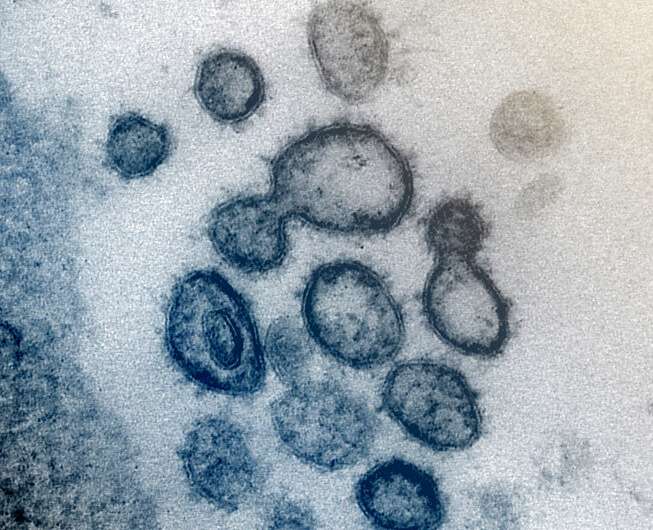This transmission electron microscope image shows SARS-CoV-2 -- also known as 2019-nCoV, the virus that causes COVID-19 -- isolated from a patient in the US. Virus particles are shown emerging from the surface of cells cultured in the lab. The spikes on the outer edge of the virus particles give coronaviruses their name, crown-like. Credit: NIAID-RML
A team of Israeli researchers is using AI to develop an algorithm-based test that can speed COVID-19 testing eightfold and help locate asymptomatic carriers, funded by a grant from the Ben-Gurion University Covid-19 Effort.
The research team, which is using a laboratory robot to conduct the tests includes Prof. Angel Porgador and Dr. Tomer Hertz from Ben-Gurion University of the Negev's (BGU) Shraga Segal Department of Microbiology, Immunology and Genetics and the National Institute of Biotechnology; Prof. Yonat Shemer-Avni, head of Soroka University Medical Center's Virology Lab, and Dr. Noam Shental from the Open University's Department of Computer Science.
Prof. Porgador, who is also the BGU deputy vice president of R&D for BGU says, "The initial results are very promising, and we are validating the method. Experience shows us that the way to slow down the spread of the pandemic is to increase the number of tests and break the chain of infection. Our method should enable a widespread operation in the near future to detect the virus in the general population, which is not quarantined, but which could threaten the public more than the patients currently under observation."
According to Dr. Hertz, "In light of the mounting evidence of the importance of asymptomatic carriers in spreading COVID-19, it is critical to locate these carriers as quickly as possible, to isolate them and thus slow the infection rate in high-risk groups. We believe that our method will help do so by dramatically speeding up testing."
They determined that the key is to divide the samples into different pools. "The planning and constructing of the pools and the way we mix the individual samples enables us to identify and follow up with those found positive for COVID-19 after far fewer tests than the norm," explains Dr. Shental.
"The next stage of the experiment is to test the medical services personnel at Soroka hospital in conjunction with the Infectious Disease Unit headed by Dr. Lior Nesher."
"The sooner we can located asymptomatic carriers, the sooner we can return to a more normal life, so this innovation holds promising potential," says Doug Seserman, chief executive officer of the New York City-based American Associates, Ben-Gurion University of the Negev. "We have a number of tests in development as a result of the fast mobilization of our researchers to address the pandemic."
























